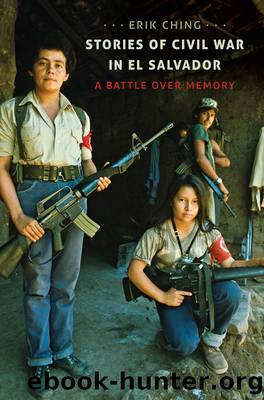Stories of Civil War in El Salvador by Erik Ching

Author:Erik Ching [Ching, Erik]
Language: eng
Format: epub
Tags: History, Latin America, Central America
ISBN: 9781469628677
Google: Q6kwDAAAQBAJ
Publisher: UNC Press Books
Published: 2016-08-26T00:21:23+00:00
We sabotaged telephone poles, electrical substations ⦠and even the hydroelectric dams, which the military considered essential and so it guarded them with battalions that resided there permanently. We did the same with army units; we began by attacking small National Guard posts in outlying municipalities and ended up attacking entire brigades; we could ambush small patrols of four or five soldiers and wipe out entire battalions in open combat.45
An explicit celebration of the combat capabilities of the FMLN is the 2008 history of the BRAZ units, Brigada Rafael Arce Zablah ¡Misión Cumplida!, based on testimonies by former members who shared their stories with Héctor Ibarra Chávez, a Mexican intellectual and activist and a fellow member of the ERP.46
Carlos Rico was tasked with organizing the RNâs supply chain from his clandestine base in San Salvador. His responsibilities included accumulating stores of cash, arranging dozens of safe houses, vehicles, and fake identifications, and setting up supply networks that could move people and goods into and out of the country, and within the country as needed.47 By any standard of measure, it was a massive undertaking, and his memoir makes evident the skills he needed to accomplish his goals, to say nothing of doing so under the threat of torture and death. His memoir often reads like a spy thriller, which suggests that he injected some artistic license into his narrative. Nevertheless, he describes such things as jetting around with briefcases full of cash and going undercover as a wealthy businessman to meet with contacts at expensive restaurants in San Salvador. Ultimately, Rico expresses the pride he feels in his accomplishments. In describing one particularly difficult mission, he concludes by saying âthe logistics functioned perfectly, all of the war material arrived to its destination; we managed to move large quantities of material, including dried milk, vitamins, soap and other necessary items, and this time we made an exponential leap in the quality of our goods, including new armaments.â Rico admits that he enjoyed his work: âOf course, I liked my work, and it was fun to overcome the danger with audacity.â48
Similarly, Eduardo Espinoza was a medical doctor in the FPL and was put in charge of organizing its field hospital. Like Rico, Espinoza faced tremendous hurdles. He had to train staff members, keep medicines and supplies on hand, perform complicated surgeriesâoften under enemy fireâand set up triage stations and a hospital capable of picking up and moving on a momentâs notice. He describes many episodes of guinda (flight) in which patients were carried through the countryside in slings over the shoulders of porters, usually at dark and barely ahead of an army invasion. But he takes great pride in having delivered all of his patients to safety and never allowing the hospital to fall into enemy hands: âWe didnât lose a single patient, nor a single member of our brave and experienced team.â Other points of pride for Espinoza revolve around his staffâs homespun solutions to complicated medical problems, like weighing things
Download
This site does not store any files on its server. We only index and link to content provided by other sites. Please contact the content providers to delete copyright contents if any and email us, we'll remove relevant links or contents immediately.
| Belize | Costa Rica |
| El Salvador | Guatemala |
| Honduras | Nicaragua |
| Panama |
Cat's cradle by Kurt Vonnegut(13934)
Pimp by Iceberg Slim(12977)
Underground: A Human History of the Worlds Beneath Our Feet by Will Hunt(11294)
4 3 2 1: A Novel by Paul Auster(11102)
The Radium Girls by Kate Moore(10950)
American History Stories, Volume III (Yesterday's Classics) by Pratt Mara L(4834)
Perfect Rhythm by Jae(4643)
Wiseguy by Nicholas Pileggi(4633)
The Fire Next Time by James Baldwin(4375)
Paper Towns by Green John(4193)
A Higher Loyalty: Truth, Lies, and Leadership by James Comey(4061)
Pale Blue Dot by Carl Sagan(4041)
The Mayflower and the Pilgrims' New World by Nathaniel Philbrick(3930)
The Doomsday Machine by Daniel Ellsberg(3761)
Too Much and Not the Mood by Durga Chew-Bose(3711)
Killers of the Flower Moon: The Osage Murders and the Birth of the FBI by David Grann(3659)
The Borden Murders by Sarah Miller(3606)
The Sympathizer by Viet Thanh Nguyen(3547)
Killing England by Bill O'Reilly(3479)
